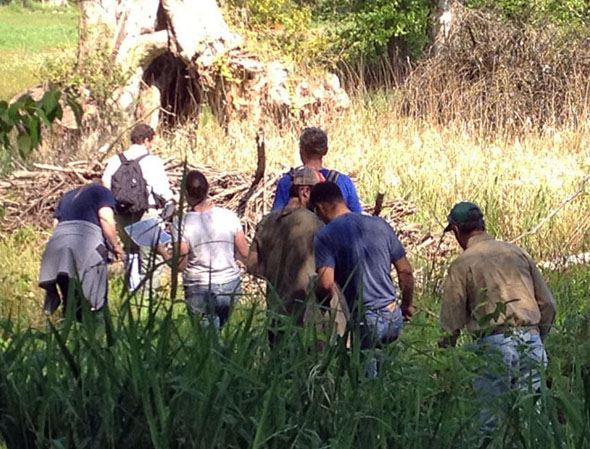
This training provides information and methods for determining the ordinary high water mark (OHWM) as defined in the state Shoreline Management Act (SMA). Waters regulated under the SMA include all tidal waters, streams greater than 20 cubic feet per second mean annual flow, water bodies greater than 20 acres in size, and any associated wetlands and deltas.
In this training, you will learn answers to these questions:
- How is the OHWM defined and where does it apply?
- What is the regulatory context and history of the OHWM?
- Why it is important to use field indicators to determine the OHWM?
- What are the most reliable field indicators on tidal waters, streams, lakes, and associated wetlands?
- What are some common misconceptions about OHWM determinations?
The three-day training includes two virtual sessions that will take place on Zoom on October 5 and October 6 (9:00 AM - 12:30 PM). Participants will have the option to log on 15 minutes early on day 1 for a brief Zoom introduction.
On October 8, the participants will complete the field component of the training. Participants will practice how to determine the OHWM at four field sites in Thurston County with an instructor and 5-7 participants. The sites include a high-energy marine site (Burfoot Park), low-energy marine site (Woodland Creek), lake site (Longs Pond), and stream site (Pioneer Park). Please block your calendar from 8:30 AM - 3:30 PM for the field component.
During the field component, all participants will be expected to follow Washington Department of Ecology’s COVID-19 guidelines at the time of the training. You will likely be asked to complete a health survey 12 hours before the field component and wear a mask. After registering for the course, please email Sara Brostrom (bros461@ecy.wa.gov) if joining the in-person field session in Thurston County is a barrier to participating in the training. We will work with you to find another option (11 AICP CM Credits/CEP Points).
Instructors
Rebecca Rothwell is a Wetlands Specialist in the Southwest Regional Office and the Shorelands Technical and Regulatory Lead for the Shorelands and Environmental Assistance Program. She has worked for Ecology since 2008, doing wetland mitigation compliance, wetland and shoreland permitting, assistance with CAO and SMP updates, OHWM determinations, and technical assistance with local governments. She has a BS in biology from the University of Puget Sound and a master’s of environmental studies from The Evergreen State College.
Lynn Schmidt is the Department of Ecology’s Statewide Flood Engineer, focusing on reducing flood risks to communities while enhancing natural floodplain functions. Her career has spanned a wide range of topics within the environmental and hydraulics engineering fields, including hydraulic modeling, river restoration, floodplain management, stormwater management, environmental investigations, and monitoring. Lynn holds a BS in Civil Engineering, MS in Environmental Engineering, and is a Professional Engineer and Certified Floodplain Manager.
Doug Gresham is a wetland specialist in Ecology’s Northwest Region, and he has 24 years of consulting experience in wetlands, fisheries, water quality monitoring, mitigation design and monitoring, construction inspection, and permitting. He provides technical assistance on wetland protection to government agencies and consultants within King, Snohomish, Skagit, and San Juan Counties. He also conducts verification of consultant’s wetland delineations and ordinary high water mark determinations, and assesses the adequacy of their mitigation site designs and monitoring programs.
Hallie Ladd is a Wetlands/Shorelines Specialist with Ecology. Hallie’s role is to provide permitting and technical assistance to the local jurisdictions and citizens of Eastern Washington. Her professional background includes work in aquatic ecology, fisheries, and natural resource damage assessment and restoration. Hallie’s education includes a Bachelor’s degree in Biology from Minnesota State University Moorhead and a Master’s degree in Fisheries Science from Texas Tech University.
Jeremy Sikes began working at the Department of Ecology in 2007 as a shorelines and wetlands permit specialist and transitioned to shorelines planning in 2012. Currently Jeremy is the Eastern Regional senior shorelines planner. In this role he works with local governments on Shoreline Master Program updates, conducts shoreline permit review and technical support, participates in statewide shorelines policy groups, and supports Ecology’s legislative actions and responses. Jeremy is an EWU alumnus with a BS in Biology and a minor in Planning. He previously worked as a fisheries specialist for both Tribal and state fisheries departments, and spent seven years as a consulting fisheries biologist throughout the western U.S.
